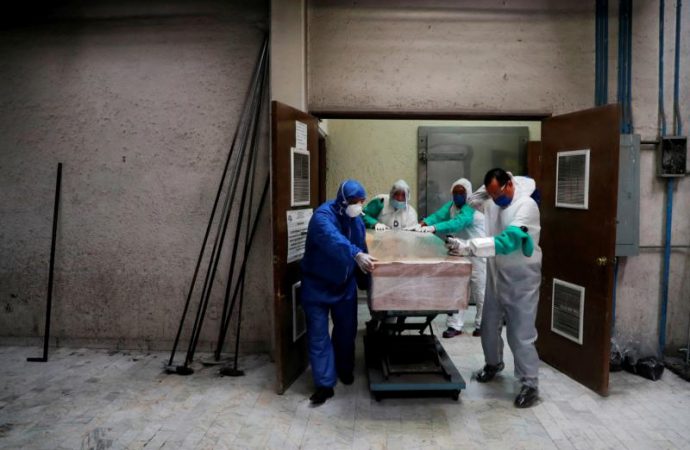The Vatican official holds the day to remember coronavirus victims


Funeral and crematorium employees push a coffin carrying a victim of COVID-19 to the San Isidro crematorium in Mexico City on May 21, 2020. (Credit: Carlos Jasso / Reuters via CNS.)
ROME - The president of the Pontifical Academy for Life, publicly supporting a proposal to establish a national day in Italy to commemorate the tens of thousands of people who lost their lives due to COVID-19, said that formally remembering the dead is important.
In an editorial published on May 28 by the Italian newspaper La Repubblica, Archbishop Vincenzo Paglia supported the proposal of the Italian journalist Corrado Augias and said it was an opportunity for Italians and the world to remember those who died and to reflect on one's own mortality.
"The mortal condition cannot be overcome, but asks to be at least" understood ", to be lived with words, signs, closeness, affection and even silence," said Paglia. "For this reason, I am very much in favor of the proposal to establish a national day for the commemoration of all victims of COVID-19."
As of May 28, over 357.000 people worldwide had died of coronavirus, including over 33.000 in Italy. The death toll in Italy continued to decline after restrictive measures were applied to contain the virus.

Archbishop Vincenzo Paglia, president of the Pontifical Academy for Life, speaks during an 2018 interview in his office in the Vatican. (Credit: Paul Haring / CNS.)
However, the death toll has continued to rise in other countries around the world, including the United States with an estimated 102.107 deaths, 25.697 in Brazil and 4.142 in Russia, according to Worldometer, a statistical site that monitors the pandemic.
In his editorial, Paglia said that the death toll "reminded us mercilessly of our mortal conditions" and that, despite the scientific advances that have lengthened and improved people's lives, he managed "to the maximum, to postpone the end of our earthly existence, do not cancel it. "
The Italian archbishop also denounced attempts to censor public discussions of death as "signs of an awkward attempt to remove what objectively appears to be the most unbearable feature of our human existence: we are mortal".
However, he continued, the fact that people were unable to stay with or mourn the loss of loved ones who died of COVID-19 or other diseases during the blockade "has affected all of us more than the number of victims." .
"This was the scandal we all felt when we saw pictures of army trucks taking bodies from Bergamo," he said, referring to a photo published by the pandemic epicenter in Italy. "It was the infinite sadness that many relatives felt that they were unable to accompany their loved ones in this decisive step of their life."
Paglia also praised the work of doctors and nurses, who "took the place of relatives" in their last moments, making the thought of a loved one who dies in solitude "less unbearable".
The establishment of a national day to remember those who died, he added, would give people the opportunity to develop this experience of death and "try to live it in a human way".
"This terrible experience we are living has reminded us powerfully - and in the same providential way - that safeguarding the extraordinary dignity of each person, even in his tragic end", is a requirement of true brotherhood, said Paglia